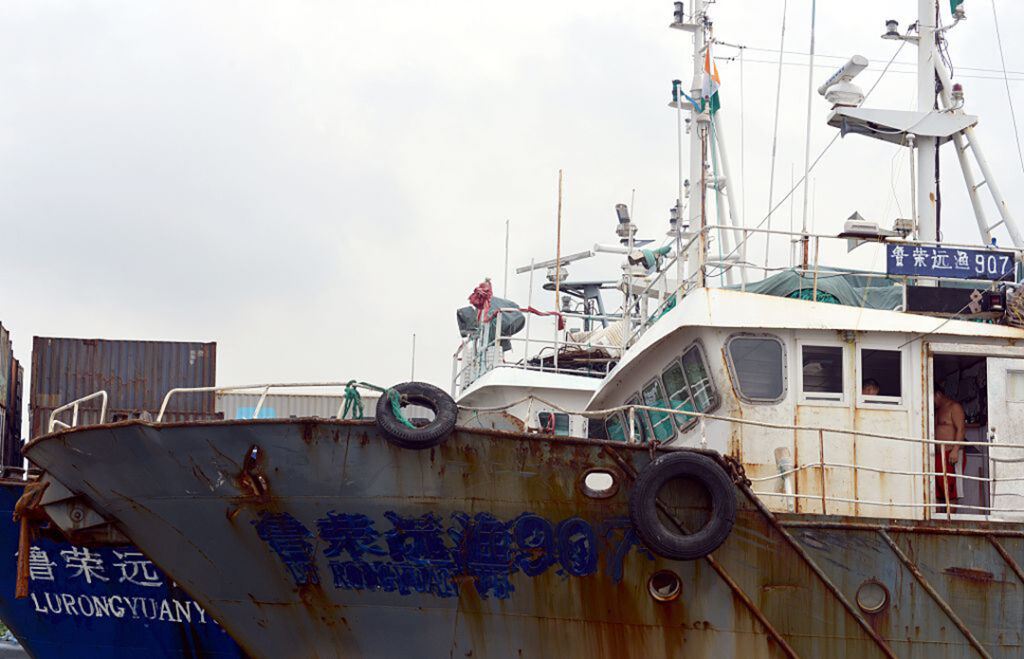ADF STAFF
Despite efforts by coastal African nations to curb illegal, unreported and unregulated (IUU) fishing, one of every four fish still is being caught illegally as the continent’s stocks plummet.
Illegal marine trade costs the West Africa region almost $1.95 billion across the fish value chain and $593 million a year in household income.
The best ways to tackle IUU fishing include improving international cooperation and information sharing, implementing existing port controls, and using inexpensive vessel-tracking technology, according to a research paper commissioned last year by the High Level Panel for a Sustainable Ocean Economy.
A May 2020 incident involving a Chinese fishing vessel underlined how some of those strategies are working. Pirates overtook the Hai Lu Feng 11 and kidnapped its 11-member crew off Côte d’Ivoire. The trawler sailed through the exclusive economic zones of Ghana, Togo and Benin before being stopped off the coast of Nigeria.
Information sharing across the region and collaboration between the Beninese and Nigerian navies led to the successful release of the vessel and the hostages, Ian Ralby, a maritime security and law expert, wrote in a story published by the Center for International Maritime Security.
A plethora of collaborative, combined and regulatory efforts to deter IUU fishing already exist in Africa, including regional fisheries management organizations and the Yaoundé Code of Conduct, a regional maritime security architecture.
But protecting fisheries can be complicated because it requires countries to record how much fish is caught and where, determining whether trawlers have the proper licenses, whether they accurately report their catch, and whether they’re using legal gear.
“The law enforcement side [also] looks at other things like fisheries crime, where the fishing sector is used for other illicit activity, including drug trafficking, arms trafficking, human smuggling and trafficking, and other more abstract crimes like money laundering and countering the financing of terrorism,” Ralby, CEO of I.R. Consilium, told ADF in an email. “You have both bits of the equation looking at collaborative efforts across the region.”
‘A Profoundly Sovereign Issue’
Regional efforts to deter IUU fishing aren’t working as well as they could be because fisheries are “a profoundly sovereign issue” in which neighboring countries may govern their waters differently, Ralby said, adding that corruption among fisheries officials is “rampant” in many parts of the world.
“There are officials whose job it is to protect the resources of the state, and they are allowing those resources to be stolen at the benefit of their own pocket,” Ralby said. “There are also people within the fisheries sector who are more than happy to cut corners to avoid responsibility and not play by the rules. That includes domestic and foreign actors.”
A study published last year by the World Resources Institute argued that IUU fishing can be better deterred through greater oversight at ports. The 2016 Port State Measures Agreement, the only binding agreement focused on IUU fishing, set minimum standards that ports must apply when vessels seek entry. Vessels suspected of IUU fishing can be inspected or denied port access.
Ralby agrees that visibility of authorities at ports is essential to combating maritime crimes.
“What we are seeing is that a number of states have begun to work in that interagency, multi-agency fashion in order to shine a spotlight on fisheries and the full spectrum of areas for concern,” he said.
A key aspect to port enforcement involves creating a legal context for using satellite data and information from maritime domain awareness platforms as adequate reasons to conduct searches or arrests at port.
“The biggest factor in terms of making that kind of approach successful is to build the political will,” Ralby said. “That requires senior officials to overcome what I call ‘maritime wealth blindness,’ where they see there’s value in the maritime domain but don’t understand how much it’s worth. Not to them, individually, but to the country. [Officials with that knowledge] wouldn’t be so prone to engage in corrupt practices.”

